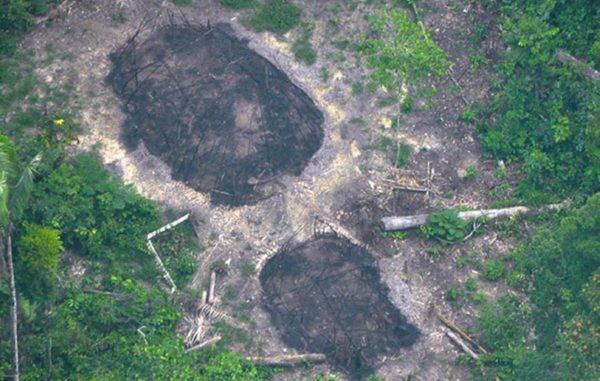
by Deep Green Resistance News Service | Sep 9, 2017 | Colonialism & Conquest
Featured image: Evidence of an attack? Burnt communal houses of uncontacted Indians, seen in December 2016, could be signs of another massacre in the Uncontacted Frontier. © FUNAI
by Survival International
Public prosecutors in Brazil have opened an investigation after reports that illegal gold miners in a remote Amazon river have massacred “more than ten” members of an uncontacted tribe. If confirmed, this means up to a fifth of the entire tribe have been wiped out.
Two miners have been arrested.
The killings allegedly took place last month along the River Jandiatuba in western Brazil, but the news only emerged after the miners started boasting about the killings, and showing off “trophies” in the nearest town.
Agents from Brazil’s indigenous affairs agency, FUNAI, confirmed details of the attack to Survival International. Women and children are believed to be among the dead. FUNAI and the public prosecutor’s office are currently investigating.
The area is known as the Uncontacted Frontier, as it contains more uncontacted tribes than anywhere else on Earth.
Several government teams who had been protecting uncontacted indigenous territories have recently had their funding slashed by the Brazilian government, and have had to close down.
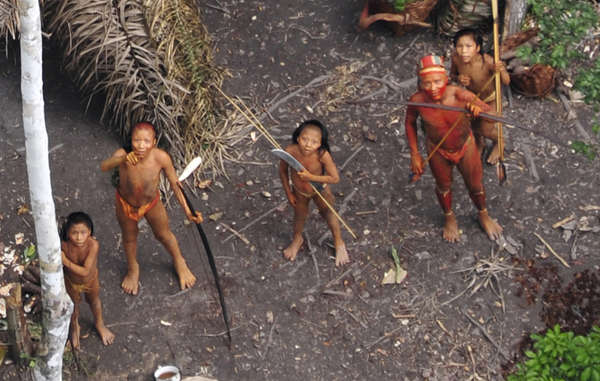
Uncontacted Indians in the Brazilian Amazon, filmed from the air in 2010. © G.Miranda/FUNAI/Survival
President Temer’s government is fiercely anti-Indian, and has close ties to the country’s powerful and anti-indigenous agribusiness lobby.
The territories of two other vulnerable uncontacted tribes – the Kawahiva and Piripkura – have also reportedly been invaded. Both are surrounded by hundreds of ranchers and land invaders.
Uncontacted tribes are the most vulnerable peoples on the planet. However, when their rights are respected, they continue to thrive.
All uncontacted tribal peoples face catastrophe unless their land is protected. Survival International is doing everything it can to secure their land for them, and to give them the chance to determine their own futures.
Survival’s Director Stephen Corry said: “If these reports are confirmed, President Temer and his government bear a heavy responsibility for this genocidal attack. The slashing of FUNAI’s funds has left dozens of uncontacted tribes defenseless against thousands of invaders – miners, ranchers and loggers – who are desperate to steal and ransack their lands. All these tribes should have had their lands properly recognized and protected years ago – the government’s open support for those who want to open up indigenous territories is utterly shameful, and is setting indigenous rights in Brazil back decades.”
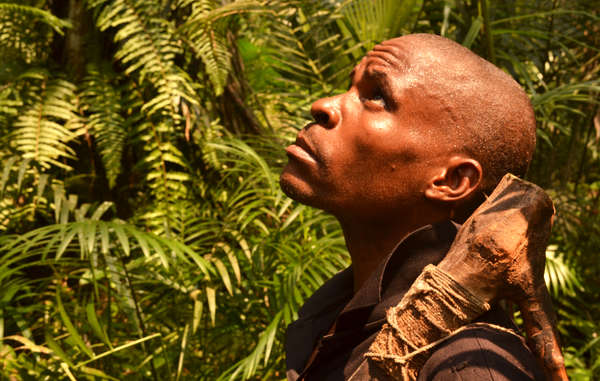
by Deep Green Resistance News Service | Jun 30, 2017 | Colonialism & Conquest
Featured image: Vast swathes of the Bayaka’s ancestral homelands in the Republic of Congo have been taken over without their consent by loggers and big conservation NGOs. © Lambert Coleman
by Survival International
An investigation by Survival International has revealed that the Wildlife Conservation Society (WCS), the parent organization of New York’s Bronx Zoo, is funding the abuse and eviction of Bayaka “Pygmies” and other rainforest tribes in the Republic of Congo.
WCS manages and helped create a national park on Bayaka land without the tribe’s consent, and has formed a partnership with two logging companies working on their land. WCS is also funding anti-poaching squads which prevent the Bayaka from entering their ancestral lands, and Survival International has documented dozens of instances of harassment, beatings and even torture.
The Bayaka are frequently accused of “poaching” when they they hunt to feed their families. Tribal people have complained that this diverts action away from tackling the true poachers – criminals conspiring with corrupt officials.
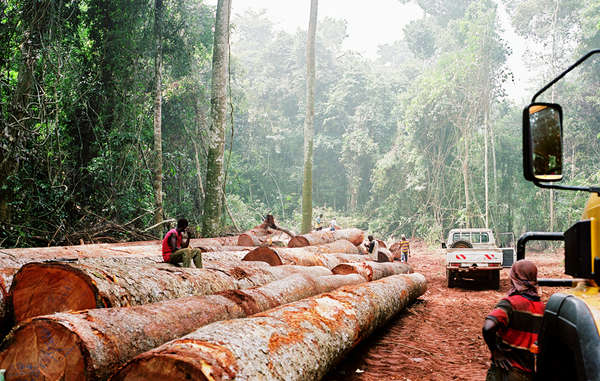
Big conservation has failed to prevent widespread logging on tribal land, and has actively contributed to serious human rights abuses. © Kate Eshelby /Survival
Victims have included children, the elderly and disabled people. In 2012, for example, a severely disabled tribal man was assaulted by guards. In May 2016, one man was hospitalized after he and four others were brutally beaten by guards. Forest camps are frequently destroyed, and tribal people are attacked and tortured for accessing land which they have been dependent on and managed for generations.
A Bayaka man said: “If you go into the park they will get you and take you to prison. Even outside the park they say ‘We’re going to kill you. Get out, get out, get out.’”
Logging in the region continues at unsustainable levels, according to reports by independent researchers and advocacy groups, including Greenpeace. Many observers including the United Nations and Congolese organization l’Observatoire congolais des droits de l’homme, have been warning about the consequences of ecoguard abuse since at least 2004, but no effective action has been taken.
In 2005, a Bayaka man reported that: “We met another white man [from WCS] who came to tell us to stop hunting and that the wildlife guards would make sure we did. Now we are afraid to go far in the forest in case the wildlife guards catch us.”
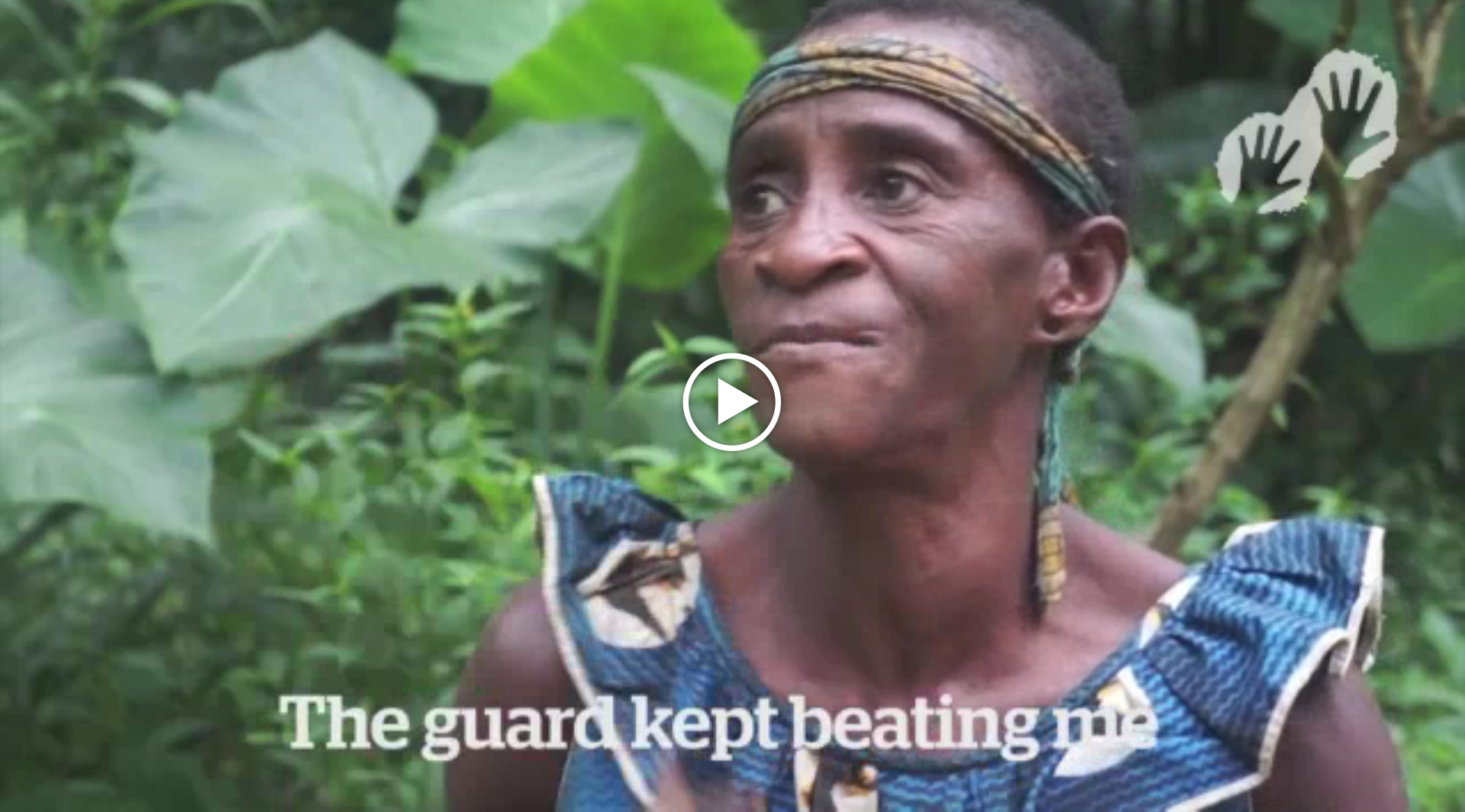
Watch: Apfela describes how wildlife guards, supported by the Wildlife Conservation Society, brutally attacked her.
Survival’s Director Stephen Corry said: “Conservation in the Congo Basin is based on land theft. National parks are created on indigenous peoples’ territories without their consent: It’s land-grabbing (with a “green” label) and the big conservation organizations, like WCS, are guilty of supporting it. Survival International is doing all it can to stop this “green colonialism.” It’s time for conservationists to respect land rights, stop stealing tribal peoples’ ancestral homelands, and obtain proper permission for every project they seek to carry out on tribal land.”
Background briefing
-WCS is one of the world’s oldest conservation organizations, founded in 1895.
-WCS backed the creation of Nouabalé-Ndoki National Park in 1993 without the Bayaka’s consent. It manages the park to this day.
– The organization runs an annual “Teddy Roosevelt Award” for conservation. In 2017, the award generated controversy when it was presented to Gabon’s president Ali Bongo, who has been widely criticized for his government’s record of human rights abuse. According to some reports, Bongo donated $3.5m in exchange for the award.
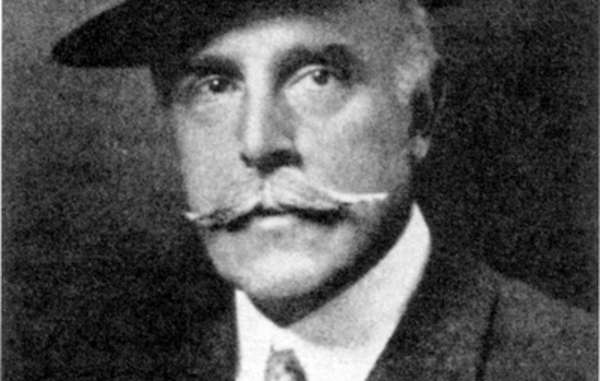
Madison Grant, notorious eugenicist and founder of the organization which would become the Wildlife Conservation Society (WCS). © Wikimedia Commons
– The Bronx Zoo and the conservation organization that would become WCS were founded by eugenicist author Madison Grant. Infamously, they brought a “Pygmy” man, Ota Benga, to the zoo in the early 1900s. He was exhibited to the public, and encouraged to live in the zoo’s monkey house. He committed suicide in 1916.
– Bayaka people in the Central African Republic and Republic of Congo wrote open letters to WCS and its funders in 2016.
– The abuse of Bayaka by WCS-supported squads has been documented for at least 18 years, but the organization has failed to take effective action to stop it.
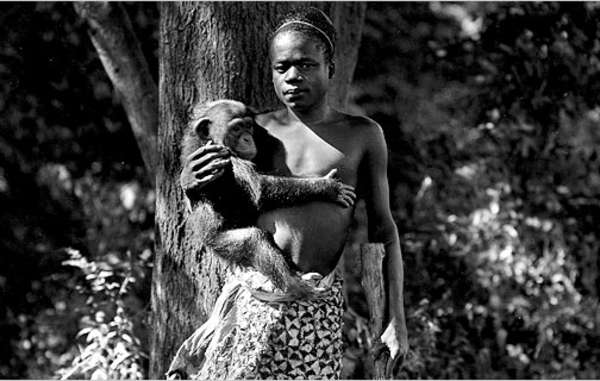
Ota Benga, a Congolese ‘Pygmy’ man who was transported to the US and exhibited in zoos, before committing suicide in 1916. © Wikimedia
WCS is not the only multinational NGO implicated in the abuse of tribal peoples. Many of the big conservation organizations are partnering with industry and tourism and destroying the environment’s best allies.
It’s a con. And it’s harming conservation. Survival International is leading the fight against these abuses, for tribes, for nature, for all humanity.
“Pygmy” is an umbrella term commonly used to refer to the hunter-gatherer peoples of the Congo Basin and elsewhere in Central Africa. The word is considered pejorative and avoided by some tribespeople, but used by others as a convenient and easily recognized way of describing themselves.
Some names have been changed to protect tribal people’s identity.
by Deep Green Resistance News Service | Dec 18, 2016 | Colonialism & Conquest
Featured image: The Congo Basin tribes have lived sustainably in the forests of central Africa for generations.
© Selcen Kucukustel/Atlas
by Survival International
In an unprecedented protest, 19 “Pygmy” communities in central Africa have denounced conservation projects on their land. Eleven of the communities have urged conservationists to stop funding the anti-poaching squads who have abused them.
The Worldwide Fund for Nature (WWF) and the Wildlife Conservation Society (WCS) – two of the world’s biggest conservation organizations – have helped to create protected areas in the region from which tribal peoples have been illegally evicted.
The Baka and Bayaka “Pygmies” and their neighbors have endured years of violence, intimidation and abuse as a result of these conservation projects in Cameroon, the Congo, and the Central African Republic. But the organizations behind them, including WWF and WCS, have failed to change their approach, and continue to fund the squads.
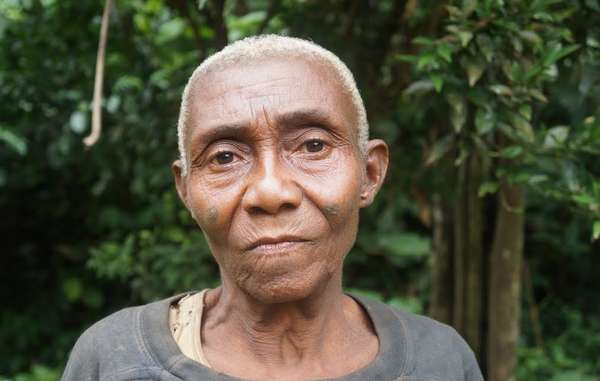
Ndoye, a Baka woman from Cameroon. Five people are reported to have died in her community alone at the hands of WWF-funded wildlife guards.
© Survival
In one letter Baka said: ”How are we going to survive in this world? We say to those who are giving money to [the conservationists]: ‘Do you want them to kill us?’ We no longer live well.”
Bayaka from the village of Socambo, said: “Despite the money that you provide to conserve the forest, we don’t benefit at all. Our ancestors lived perfectly well in this forest… Please think of us poor indigenous people who use our forest. We are fed up with how the project has cut us off from the forest.”
Bayaka from Mossapoula said: “We … are suffering a lot because of conservation. The guards threaten us, beat us, steal from us, even outside the park. And yet we have the right to enter the park. We ask you to come to Mossapoula before continuing your funding in order to hear our problems and seek our consent.”

Saki, a Bayaka woman whose husband was found murdered in the forest. From evidence at the scene, the family is convinced that he was killed by wildlife guards.
© Survival
The Bakwele chief of Ndongo said: “WWF has been coming here since 1996. We used to be very happy. But now we find ourselves marginalized and tormented in every way… We here are now only living on rice, really. Sir, your agents are very, very aggressive and we don’t want them to come here any more.
“In short, to those funders: if you have any projects, come to the field yourselves. I repeat: your agents are not here for work but for corruption. The guards have become the real poachers. They no longer respect the park limits. We no longer have access to the park.”
“Pygmies” face harassment and beatings, torture and even death while big game trophy-hunting tourists are encouraged. Tribal peoples are illegally evicted from large parts of their ancestral land and forced to live on roadsides where poverty and disease are rife. They have faced violence and plummeting health standards in the name of conservation – while WWF and WCS partner with logging companies like Rougier, CIB and SINFOCAM.
Survival’s Director Stephen Corry said: “As these powerful statements from “Pygmies” show, conservation projects are proving deadly for tribal peoples in the Congo Basin. As they see it, WWF and WCS have taken their land, ignored their rights, and continue to fund those abusing them. WWF and WCS have turned natural allies of conservation into its victims. The big conservation organisations really must start listening to these tribal peoples.”

Cameroonian wildlife guard Mpaé Désiré, who in 2015 was accused of beating Baka and in 2016 was arrested for involvement in the illegal wildlife trade.
© Facebook
Background briefing
– WWF has been active in the Congo Basin for decades. Survival first raised concerns over its proposed projects in 1991.
– The region is home to dense rainforests and several iconic species, including the giant pangolin, lowland gorilla and forest elephant. Tribal peoples like the Baka and Bayaka have been dependent on and managed this environment for generations.
– According to European Union reports, no logging activity in Cameroon is being carried out lawfully. Despite this, WWF has entered into partnerships with several companies who are active in the region.
– WWF cites the need to protect wildlife from poachers as the justification for funding, training and equipping wildlife guards. However, several of these guards have themselves been involved in the illegal wildlife trade. Earlier this year, for example, one guard, Mpaé Desiré was arrested for involvement in the illegal wildlife trade.
– A Baka man told Survival: “Guards used to open tins of sardines and leave them as bait to attract leopards, so they could hunt them for their skins.” Rainforest tribes have unparalleled knowledge of their environment, but WWF has instead put its faith in armed guards and corrupt officials.
Tribal peoples have been dependent on and managed their environments for millennia. Their lands are not wilderness. Evidence proves that tribal peoples are better at looking after their environment than anyone else. They are the best conservationists and guardians of the natural world. They should be at the forefront of the environmental movement.
But tribal peoples are being illegally evicted from their ancestral homelands in the name of conservation. The big conservation organizations are guilty of supporting this. They never speak out against evictions.
The big conservation organizations are partnering with industry and tourism and destroying the environment’s best allies.
Watch: Baka describe beatings and abuse at hands of anti-poaching squads.
“Pygmy” is an umbrella term commonly used to refer to the hunter-gatherer peoples of the Congo Basin and elsewhere in Central Africa. The word is considered pejorative and avoided by some tribespeople, but used by others as a convenient and easily recognized way of describing themselves
by DGR News Service | Feb 13, 2014 | Biodiversity & Habitat Destruction
By Jeremy Hance / Mongabay
Forest elephants have suffered unprecedented butchery for their ivory tusks over the past decade, according to new numbers released by conservationists today in London. Sixty-five percent of the world’s forest elephants have been slaughtered by poachers over the last dozen years, with poachers killing an astounding nine percent of the population annually. Lesser-known than their savannah cousins, a genetics study in 2010 found that forest elephants are in fact a distinct species, as far removed from savannah elephants as Asian elephants are from mammoths. These findings make the forest elephant crisis even more urgent.
“At least a couple of hundred thousand forest elephants were lost between 2002-2013 to the tune of at least sixty a day, or one every twenty minutes, day and night,” says Fiona Maisels, a researcher with the Wildlife Conservation Society (WCS) who headed the research. “By the time you eat breakfast, another elephant has been slaughtered to produce trinkets for the ivory market.”
The analysis adds new data from 2012 and 2013 to a landmark study last year, showing that despite some stepped-up conservation efforts poaching continues apace.
Forest elephants are found primarily in Central and West Africa, largely inhabiting—as its name suggests—the Congo Rainforest. However, this means that it’s not only more difficult to monitor populations hidden by great forests, but also that it’s easy for poachers to kill them and getaway with immunity. Many of the countries in which they are found are also beset by poverty, instability, and corruption, making forest elephant conservation incredibly challenging.
For example, forest elephants used to have their biggest stronghold in the Democratic Republic of Congo (DRC), but relentless poaching means that the country has lost many of its forest elephants.
“The current number and distribution of elephants is mind-boggling when compared to what it should be,” said Samantha Strindberg, also with WCS and co-author of the paper. “About 95 percent of the forests of DRC are almost empty of elephants.”
Today, Gabon holds the most surviving forest elephants with about 60 percent of the global population.
Despite the 2010 study showing that forest elephants are a distinct species, this has yet to be recognized by the IUCN (the International Union for the Conservation of Nature). The group currently lumps forest and savannah elephants together and lists them as Vulnerable. However that listing hasn’t been updated for nearly six years.
Governments are beginning to respond. Just yesterday, the Obama Administration released an ambitious new strategy for tackling global wildlife crime, including toughening restrictions on ivory and shutting loopholes. Many countries, including most recently France, have begun to destroy their ivory stockpiles. Although much of this comes years too late for many of the crippled populations of forest elephants.
“These new numbers showing the continuing decline of the African forest elephant are the exact reason why there is a sense of urgency at the United for Wildlife trafficking symposium in London this week,” John Robinson, WCS Chief Conservation Officer and Executive Vice President of Conservation and Science with the WCS, says. “The solutions we are discussing in London this week and the commitments we are making cannot fail or the African forest elephant will blink out in our lifetime.”
From Mongabay: “Ivory trade’s shocking toll: 65% of world’s forest elephants killed in 12 years (warning: graphic image)“
by Deep Green Resistance News Service | Aug 1, 2013 | Mining & Drilling
By John Vidal / The Guardian
The Virunga national park, home to rare mountain gorillas but targeted for oil exploration by a British company, could earn strife-torn DR Congo $400m (£263m) a year from tourism, hydropower and carbon credits, a WWF report published on Thursday concludes.
But if the Unesco world heritage site that straddles the equator is exploited for oil, as the Congolese government and exploration firm Soco International are hoping, it could lead to devastating pollution and permanent conflict in an already unstable region, says the conservation body.
Congo has allocated oil concessions over 85% of the Virunga park but Soco International is now the only company seeking to explore inside its boundaries. This year Unesco called for the cancellation of all Virunga oil permits.
Soco, whose board of 10 directors have wide experience with oil companies working in conflict areas including Exxon, Shell and Cairn, insist that their operations in Congo would be confined to an area in the park known as Block V, and would not affect the gorillas.
Soco chairman, Rui de Sousa, said: “Despite the views of WWF, Soco is extremely sensitive to the environmental significance of the Virunga national park. It is irrefutable that oil companies still have a central role in today’s global energy supply and a successful oil project has the potential to transform the economic and social wellbeing of a whole country.”
He added: “The park has sadly been in decline for many years officially falling below the standards required for a world heritage site. The potential for development just might be the catalyst that reverses this trend.”
However Raymond Lumbuenamo, country director for WWF-Democratic Republic of the Congo, based in Kinshassa, said that security in and around the park would deteriorate further if Soco went ahead with its exploration plans.
“The security situation is already bad. The UN is involved with fighting units and the M23 rebel force is inside the park. Oil would be a curse. It always increases conflict. It would attract human sabotage. The park might become like the Niger delta. Developing Virunga for oil will not make anything better.”
“The population there is already very dense, with over 350 people per sqkm. When you take part of the land (for oil) you put more pressure on the rest. Oil would not provide many jobs, people would flood in looking for work,” he said.
One fear is that the area is seismically active and another eruption of one of the volcanoes in the park could damage oil company infrastructure and lead to oil spills in the lakes. “Virunga’s rich natural resources are for the benefit of the Congolese people, not for foreign oil prospectors to drain away. Our country’s future depends on sustainable economic development,” said Lumbuenamo.
“For me, choosing the conservation option is the best option. We can always turn back. Once you have started drilling for oil there’s no turning back,” he said.
But Raymond accepted that while the gorillas were safe at present, the chances of the park generating its potential of $400m a year were remote. “It would be difficult to make the kind of money that the report talks of. Virunga used to be a very peaceful place and can be again. The security situation right now is bad. The UN is involved with fighting units. Its not as quiet as it used to be.”
Read more from The Guardian: http://www.theguardian.com/environment/2013/aug/01/congo-mountain-gorillas-virunga-wwf










